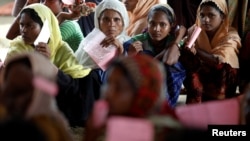A visit by United Nations officials to Myanmar’s Rakhine state went ahead Monday, after authorities postponed it last week, as the number of Rohingya Muslims fleeing violence in the northern state has topped more than half a million.
U.N. Resident Coordinator Renata Lok-Dessallien, World Food Program (WFP) representative and Deputy Humanitarian Coordinator Domenico Scalpelli and senior U.N. Refugee Agency official, Cécile Fradot participated in the government-guided trip, the U.N. said.
“This was a positive step and our colleagues in Myanmar believe it could help in our efforts to explore how the U.N. could cooperate with the Myanmar authorities to alleviate the dire situation in northern Rakhine,” U.N. Spokesman Farhan Haq told reporters in New York.
He did not have any details on what the three officials witnessed in the area, where there have been reports of widespread burning of Rohingya Muslim villages, as well as rapes, killings, looting and the laying of landmines by the Myanmar authorities.
Violence erupted in Rakhine on August 25, after attacks by Rohingya militants on state security forces led to military reprisals. Myanmar authorities have said there have been no clashes since September 5, but the exodus continues daily by the thousands into neighboring Bangladesh.
U.N. Secretary-General António Guterres has called for an immediate end to all military operations in Rakhine; unhindered humanitarian access; and the voluntary and safe return of refugees to their homes in Myanmar.
Last week, he told the U.N. Security Council that the situation has become the world’s fastest developing refugee emergency. The U.N. says 507,000 mostly Rohingya Muslims have crossed into neighboring Bangladesh since late August.
In Geneva, Myanmar Minister Win Myat Aye was quoted by Reuters as telling the U.N. Refugee Agency’s Executive Committee meeting that it is an “immediate priority” for the government to bring back the refugees.
"The repatriation process can start any time for those who wish to return to Myanmar,” the news agency quoted the minister as saying. "Those who have been verified as refugees from this country will be accepted without any problem and with full assurance of their security and their access to human dignity."
The Rohingya are one of many ethnic minorities in Buddhist-majority Myanmar. They are considered to be economic migrants from Bangladesh and have been denied citizenship, even though most can show that their families have been in the country for generations.
The U.N. has appealed for $77 million to meet emergency needs of the refugees. Separately, UNICEF is asking for $76 million to help 720,000 Rohingya children – those who have arrived since August, as well as thousands more who came before the current crisis.




